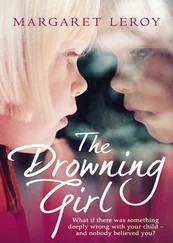The shouting stops, there are rapid footsteps along the corridor. The door bangs as it is pushed back. He comes into the room, then stops quite suddenly when he sees me.
‘What are you doing here?’ he says, as though I’m someone he knows, and I shouldn’t be there.
He’s a little taller than me, with cropped greying hair and a lived-in face. Forty-something. I see in a theoretical kind of way that he is quite attractive: that other women may like the way he looks.
‘I’m sorry.’ I feel an acute, disproportionate embarrassment about everything—hearing the quarrel, that I’m here at all.
He’s staring at me still, as though he finds me perplexing.
‘I’m Ginnie Holmes from the Westcotes Clinic,’ I tell him.
‘Hi, Ginnie,’ he says. He reaches out, as though he’s remembering how he ought to behave. I half get up, unsure what to do. He shakes my hand, and I notice the warmth of his skin.
‘The desk sergeant showed me through,’ I say.
‘He could have told me,’ he says.
I decide that Clem was right: that he is a difficult man.
He’s restless, the energy of his anger still hanging around him. He sits at the desk and takes out his cufflinks and pushes up his sleeves.
‘So, Ginnie, how can I help you?’ His gaze is hard, puzzled.
‘I’ve been trying to ring you,’ I tell him. ‘I couldn’t get through.’
‘That happens, I’m afraid,’ he says. ‘It’s been crazy here. Tell me what I can do for you.’
I tell him I’m a psychologist, that I’m working with a child that I don’t understand.
He’s leaning forward across the desk, his hands loosely clasped in front of him. His hands are close to mine. I notice the pale skin, the dark hairs on the backs of his fingers, the lilac web of veins inside his wrists.
I tell him about Kyle, how I feel he’s been through some trauma but I don’t know what it was. Will Hampden has his eyes on me, dark eyes, with red flecks in. As I talk I’m very conscious of his intent, puzzled gaze. I decide he doesn’t like me. I think how I must seem to him, prissy, bland, ineffectual; my skin reddened from walking here, my hair all messy from the morning’s rain.
‘I don’t remember the name,’ he says, ‘but that doesn’t mean a thing. I’ll have a look on Crim Int. Let’s see what we can find out for you.’
He searches on his computer and gives me the dates the police were called to the house. He says he’ll have a word with the officer involved.
‘Where can I find you, Ginnie?’
I give him my cell phone number.
‘I’ll see what I can do for you,’ he says.
I know this means that our conversation is over. I get up, pull my jacket round my shoulders. I have an odd, incomplete feeling, but there’s no reason to stay.
‘OK, then. Thanks.’
‘My pleasure,’ he says. He sits there for a moment, looking me over. There’s something unequal about this, the way he doesn’t stand although I’m standing, as though he’s breaking some unspoken rule.
‘I like the shoes,’ he says.
‘Thanks.’ I make a little dismissive gesture, unnerved by this, not knowing what to say. ‘To be honest, I’m not sure they’re really me,’ I tell him. Then wonder why I said that.
His eyes hold mine.
‘What is really you, Ginnie?’ he says.
My stomach tightens. I don’t say anything.
There’s a little silence while he just sits there looking at me. I can hear my breathing.
‘Well,’ he says then. He pushes back his chair: he’s brisk again, full of purpose. ‘I’ll show you out, Ginnie. Where did you leave your car?’
‘I didn’t,’ I tell him. ‘It’s in the garage. They told me the gearbox had packed up. It’s been one of those days.’
‘For me too,’ he says. He smiles at me, a sudden vivid smile.
He takes me out through the back of the station, down a long white corridor lit by harsh tubular lighting that shines into all the corners. The walls are scuffed in places, as though they have been kicked. We hear the shriek of a siren as a police car pulls away from the car park at the back of the building. I hunt around for something to say—some light appropriate comment—but my mind is blank, as though all thoughts have been erased.
‘I’d give you a lift,’ he tells me, ‘but there’s someone I’ve got to see. Some crap meeting that got set up and nobody bothered to tell me. I’d like to have given you a lift.’
‘I’ll be fine,’ I tell him.
We come to the door that opens onto the car park.The doorway is quite narrow and he’s standing close to me: he smells of rain and smoky rooms, and some faint spicy cologne.
He looks at me in a serious way, unsmiling now.
‘Sorry about the shouting,’ he says. ‘Someone messed up. Sorry. You shouldn’t have heard that.’
‘Don’t worry,’ I say blandly.
‘I wouldn’t like you to think I’m always shouting at people,’ he says.
I put my hand on his arm. It’s happened without thought, an instinctive gesture of reassurance. But his sleeve is rolled up and I touch his skin. It’s inappropriate, far too intimate, and I know he likes it. He turns to me: his face is close to mine. It would be the easiest thing in the world to reach out and trail my finger down the side of his face. It enters my mind that this is how it will be. The thought astonishes me.
The voice comes on the intercom again: the registration number, the body they need to identify, repeated over and over. This is how it happens, with the news of a death, with someone’s story ending.
I turn and walk across the car park between the lines of police cars, quickly, without looking back. I feel how his gaze follows me. In my new red shoes, the ground feels insubstantial under my feet, as though it could slide away from me.
That night I have a dream about Will Hampden. It’s a sexual dream—which is not in itself unusual, I have such dreams quite often. But usually they’re rather vague—as though my unconscious mind demurely follows the conventions of between-the-wars Hollywood movies. In these dreams, some indeterminate man, a stranger whose face I don’t see, might hold me or kiss me, or stand behind me and run his hand through my hair. Or the sexual feeling might be allied to some entirely neutral image: I might simply be swimming in a sunlit sea. And these images will be transient, rapidly merging with some other blurry narrative.
This dream is different. A dream of penetration, first his fingers, then his cock, gentle, slow, insistent. And it’s quite precise and vivid. I’m on top of him in the dream, I’m gazing down at him, seeing his face quite clearly, my eyes on his as he moves so deeply inside me: and it seems to go on for a very long time, though the end still comes too soon.
We park near the restaurant in a wide mellow street. The girls extricate themselves from the back of the car: they have bags of clothes wedged round their feet, and boxes on their knees.
Honeyed autumn sunlight falls on Molly as she steps out onto the pavement. She’s wearing her flimsiest top, her most flamboyantly embroidered jeans. Her face is creased with worry.
‘What if someone nicks the car while we’re having lunch?’ she says. ‘All my stuff’s in there.’
She chews absently at a tendril of hair that’s slipped out of her hairband.
‘For God’s sake, Molly, no one will steal it,’ says Greg.
‘We’ll sit in the window,’ I tell her. ‘Then you can keep an eye on it.’
Greg raises his eyebrows.
Molly’s nervousness is like a glittery sheen on her. She moves on to her next worry.
‘Are you sure other people will have their parents with them?’
Читать дальше












